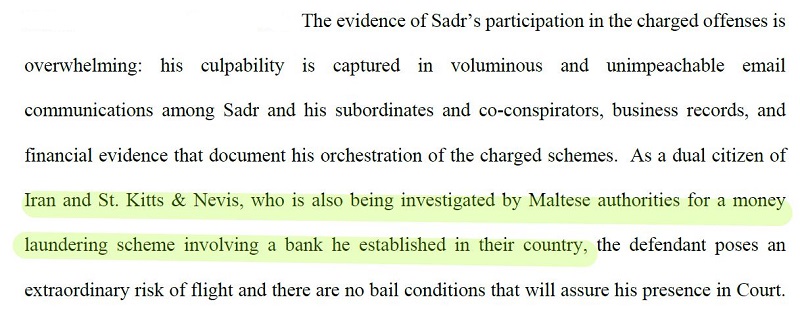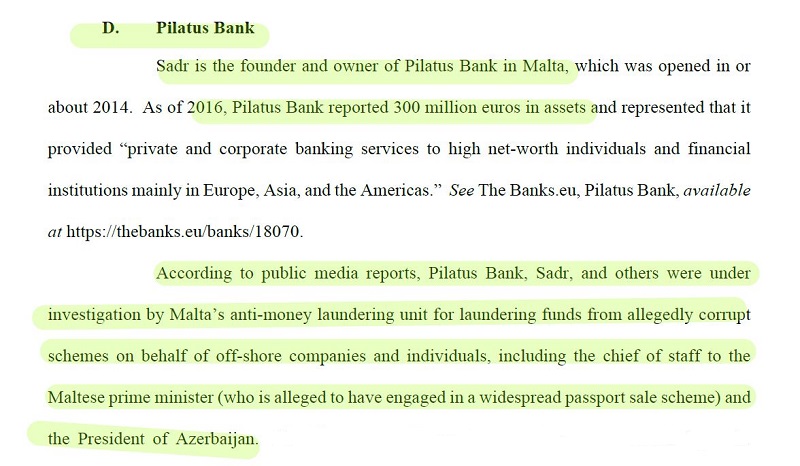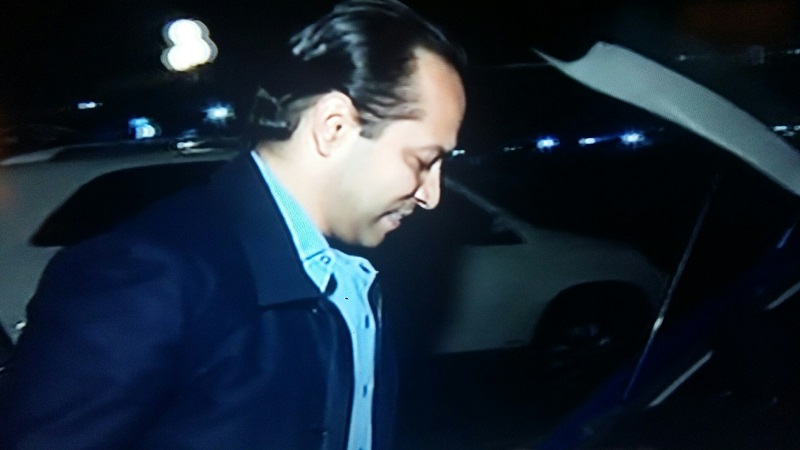The owner of Pilatus Bank, Ali Sadr Hasheminejad was, as anyone who cares knows, arrested in New York some weeks ago and charged with sanctions-busting. This crime is United States-specific and, as his supporters in Malta were quick to point out, it does not appear that Pilatus Bank was used as a vehicle for Ali Sadr to carry out his (alleged) crimes.
Or that anything had happened that should concern these supporters.
That this citizen of St Kitts & Nevis, and of a number of other countries, has supporters in Malta – and which side of the political spectrum they occupy – is not in debate.
When Joseph Muscat’s Labour Party won the early 2017 elections, one of the stranger sights in the aftermath was that of Labour supporters, not obviously investors or depositors in Pilatus Bank, capering about in front of its premises. Some Labour ‘Big Beasts’ are also known to be depositors in and boosters of Ali Sadr’s outfit, for reasons known only to them.
If or when the fellow is granted bail in New York, it would not be surprising if we had the same sort of spectacle: when Labour’s sacred cows achieve even an illusory triumph, the flags are unfurled and the trolls crow.
A quick note about bail would be in order.
In brief, the concept is a reflection of the maxim that underlies the law in civilised countries that one is innocent until proven guilty. The chattering classes invariably ramp up their disgust whenever anyone charged with a crime that has impinged on their consciousness is granted bail. Just as every time there is a bad traffic accident, everyone and her sister knows exactly who is at fault, every alleged criminal is guilty as sin from minute one.
In fact, and at law, the granting or otherwise of bail is supposed (and I use the word because judges are human too) to be governed by principles such as flight risk, the impact of the nature of the alleged offence and the personal characteristics of the accused individual. These aspects are considered within a process that balances the rights and expectations of the individual and of society at large.

In the case of Ali Sadr, these principles would have been discussed during the oral proceedings before the ‘lower court’, when bail was denied. They have now been amplified by extensive written submissions that I have read.
The one submitted by Ali Sadr’s legal team – unsurprisingly – portray him as, well, if not a saint walking the earth, at least an individual whose inspirations are to be found squarely on the ‘hand on heart, gazing tearily at the flag and apple pie; side of the spectrum of motives inspiring aspirant model citizens of the United States. Ali Sadr’s counsel seem to have no compunction in using twee “mom” and “dad” descriptors when describing his place within his model family and invoking the heart-warming notion of friends and relatives flocking to place the entire range of their assets in guarantee that he will, if granted bail, not cut and run.
The US Government’s lawyers are, on the other hand, significantly unimpressed.
They outline in their thirty-plus page submission precisely why, according to them, Ali Sadr is a flight risk, why he should not, despite his heart-felt protestations, be considered to be a person of integrity such that he will present himself for trial and why, all in all, the case against him is serious enough for the Court to want to keep him handy for trial.

An analysis of the legal issues involved, beyond the brief outline given, is not even remotely feasible in this piece. In any event, whether or not Ali Sadr is granted bail is not of material relevance in Malta, though it will be made to be of political relevance if he is.
What is of real interest to us, however, especially within the context of the characterisations made of Ali Sadr by the United States, is the impact on Malta and, to an extent, the slightly different picture we have been given here to that which seems to be the real one.
The general impact on Malta has already become clear.

In the wake of the Panama Papers, of Daphne Caruana Galizia’s reporting and – especially – of her vicious assassination, our name has become mud in international circles, for all that Joseph Muscat was able to grin his way to the polls and back locally.
Whether we should be tarred with this brush or not, or whether all of us deserve it (many of us clearly don’t) is not the point: Malta is now well and truly on the radar, and the headlines associating us with Ali Sadr ( such as ‘Owner of Malta Bank indicted in the US’ ) don’t help, not by a long shot.
Finance Minister Edward Scicluna can go around, before his morning espresso or not, wondering what the fuss is all about all he likes but the stark fact is that Ali Sadr was granted a banking licence by Malta’s financial services regulators. Those who know these things, admittedly to an extent with the benefit of hindsight, are clear in their minds as to whether he should have been.
Others will, and some have, put their hands on their hearts and say that ‘at the material time, there was no reason not to grant the licence’ (there are many who can say – privately if not publicly – that they were of the opinion even then that there were many reasons not to grant it) but reading through the US Government’s document, you will quickly form the opinion that someone, somewhere, should have seen smoke and wondered if there was a fire somewhere around.
Even without 20/20 hindsight, questions arise as to why, by all accounts, certain current or ex-PEPs seem to have had some form of interest in getting this “small bank” up and running or in using its services.
The Prime Minister’s Chief of Staff Keith Schembri is one such, even if the Speaker of the House does not appear to think that this is relevant, as is former EU Commissioner John Dalli.
Links with Henley and Partners or clients of theirs, and individuals such the former Managing Director of Allied Newspapers Adrian Hillman, have also been reported on, though of course being a user or a promoter of, in the commercial sense, a bank’s services are not heinous crimes, or even venial sins necessarily. You can’t blame people for noticing, however.
It is good writing practise to leave one’s readers with a little sting in the tail, so here you go.
At the same time as the ‘great and good’ within whose ranks Ali Sadr finds his supporters in Malta have been giving the impression that there’s ‘nothing to see here, move on’, the US Government tells us that it has confirmed with “Maltese investigators” that Ali Sadr and Pilatus are, actually, under investigation.

We knew that they were in the past – and we suspect we know what happened with the results of that investigation – but it’s interesting to know that they are now.
One can only hope that the current investigations will not end up as a wrapper for a chicken and chips take-away meal.












